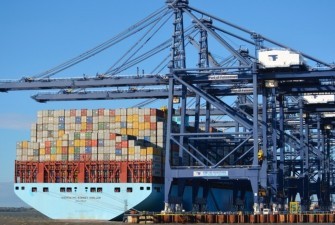
Begbies Traynor Group

18/01/2021
Brexit deal offers businesses new freedoms and red tape
An hour before New Year’s Day, at 11pm on 31 December 2020, the UK completed its formal departure from the European Union (EU). It was an unceremonious conclusion to the four-and-a-half-year saga since the referendum. Nevertheless, a new era has now begun – with new freedoms and new bureaucracies. On Christmas Eve, the EU-UK Trade and Cooperation Agreement (TCA) was agreed. Together with 2019’s Withdrawal Agreement, these two treaties now govern the UK’s future trading relationship with its largest, and nearest, neighbour – worth around £670bn in 2019.18/01/2021
BTG Global Advisory Announces Offshore Expansion
BTG Global Advisory (BTG GA) member, Begbies Traynor Group plc, today announces that it has completed the acquisition of CVR Global LLP (“CVR”). CVR is a leading independent firm of insolvency pra12/01/2021
Covid debt mountain looms when pandemic finally brought to heel
The latest UK national lockdown represents a new kind of challenge for the Government: to articulate to Covid-weary households and businesses that things will soon get better, but first they will worsen. An ambitious national vaccination campaign is underway, raising hopes that the end of the pandemic is in sight. However, at the same time we are in the grip of the virus with rates of infection soaring, exacerbated by a virulent new strain. The latest lockdown aims to protect the NHS and save lives, but it will also increase business failures. Indeed, once Covid-19 is finally brought to heel, the next challenge will be the Covid corporate debt mountain, amassed by companies forced to accept additional leverage through government loan schemes to bolster their survival prospects.22/12/2020
Retail and hospitality braces for a bleak winter as covid-19 takes its toll
In the run-up to Christmas, new data from leading insolvency firm, Begbies Traynor, has revealed the full impact of the Covid-19 crisis and tough trading conditions, which shows that nearly 40,000 (39,232) retailers – including both online and bricks and mortar stores – are now in significant financial distress.14/12/2020
UK Expands Support to Export Finance
Access to export loans has been widened in an effort to boost export activities as the post-Brexit transition period nears its end.01/12/2020
Could the government pivot to a regional-focused SME lending programme post-CBILS?
After Prime Minister Boris Johnson reluctantly announced a second national lockdown in England on Halloween to suppress the second wave surge in coronavirus cases, Chancellor Rishi Sunak responded by extending the government’s flagship loan schemes. It was perhaps inevitable, but the current extension may be the last.19/11/2020
Pandemic to accelerate SME’s embrace of alternative lenders
The maturity of the UK’s private debt market over the last decade represents a significant silver lining for growth-focused SMEs navigating the intensifying second wave of the pandemic. Back in 2008, UK high street banks controlled over 90% of the SME market for refinancing and new lending, but they were also at the epicentre of the crisis, which limited liquidity.15/11/2020
Banks’ near-term compromised bandwidth may prompt SMEs to embrace alternative lenders
Britain’s recent descent into a coronavirus ‘second wave’ with the UK government succumbing to scientific and political pressure to enforce another national lockdown in England, will blunt the momentum of any short-term economic recovery. Early predictions of the cost in lost GDP in the fourth quarter is forecast to be shallower than the 25% plunge in the second quarter.04/11/2020
Winter is coming: making plans in unpredictable times
Many corporates of all sizes feel exasperated, but not surprised, by the enduring disruption to business activity caused by the pandemic. The intensified second wave has perhaps inevitably led to a second national lockdown in England for the coming month and possibly longer.04/11/2020
Tale of two needles: Trump and Biden locked in tight White House race
Donald Trump and Joe Biden are locked in a tight race for the White House with early indicators that Trump has once again defied pollsters in his US presidential re-election bid, which this morning remains too close to call.11/08/2020
Retailers and landlords’ uncertain fate: assessing future lockdown impacts
Retail landlords are at the frontline of the economic crisis triggered by the Covid-19 pandemic within the real estate sector. Many variables will influence how landlords, and retailers, will fare in the months and quarters ahead. First, the macro context. UK GDP fell by 19.1% in the three months to May 2020, according to the Office of National Statistics. Andrew Bailey, Governeor the Bank of England, said last week that the economy contracted between “23% and 25%” in the second quarter relative to the end of last year. While an easing in lockdown restrictions has had a positive effect on some sectors – such as the housing market, which has seen increased activity – retail, leisure and hospitality are still struggling.11/08/2020
Protracted pandemic headwinds put retail landlords at centre of property sector liquidity crisis
Retail landlords’ rates of rent collection have emerged as a proxy for solvency status across the broader retail and leisure sectors. Disrupted business activities for those retailers reliant on traditional bricks and mortar footfall is severely denting their ability to make rental payments. Covid-19 has hastened the demise of the retail sector already locked in a perpetual decline for more than a decade. Driven by shifting consumer behaviour, sometimes characterised as ‘the Amazon effect‘, this decline has gathered momentum alongside the increased sophistication of supply chains and last-mile delivery infrastructure.06/08/2020
UK economy braced for record quarterly economic contraction with more pain to come
The UK economy is braced for a record double-digit contraction in economic activity for the second quarter, with the economy expected to be worse affected than many of its European neighbours and possibly even the US.29/07/2020
Europe shows solidarity in landmark debt mutualisation commitment
Europe’s leaders have concluded four days of tortuous negotiations in Brussels to unite behind a historic coronavirus recovery fund which binds the bloc into a tighter fiscal union.26/07/2020
Seven consecutive quarters of rising financial distress leaves 527,000 UK businesses in a precarious
The latest Red Flag Alert research for Q2 2020 has recorded seven consecutive quarters of increased financial impairment resulting in a record 527,000 businesses in significant* financial distress at the end of June 2020 - an increase of 33,000 since the beginning of the year.Find an Expert
Find the right professional using the below dropdowns. Our reach covers the globe with a network of over 300 offices.
Or, browse by location














